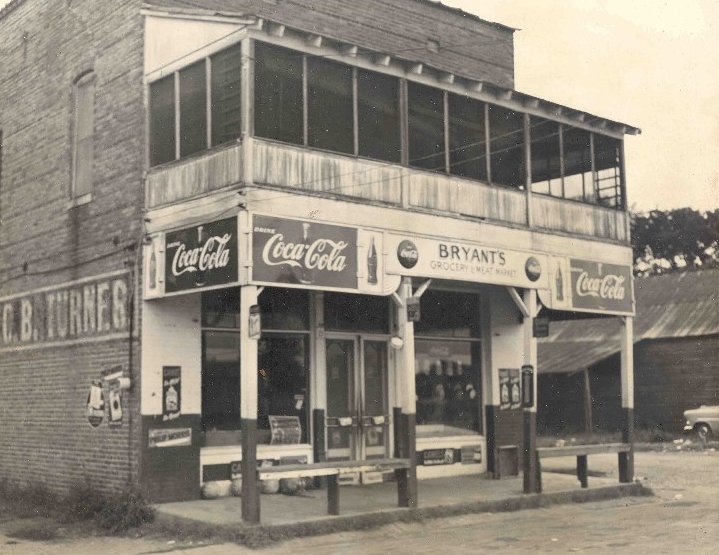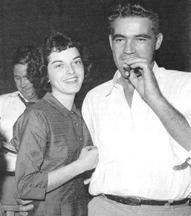
(1)
by Simeon Wright from Simeon's Story: An Eyewitness Account of the Kidnapping of Emmett Till (Lawrence Hill books, 2010)(pp.50-51)
As we reached Bryant’s store, we continued our usual small talk and banter. We were still excited about the day’s events and happy to be in town together. We all got out of the car and were milling around in the front of the store when Wheeler went in to buy a pop or some candy. Bobo [Emmett Till] went in after him; then Wheeler came out, leaving Bobo in there alone.
Maurice immediately sent me into the store to be with Bobo. He was concerned about Bobo being in the store alone because of what had happened on the previous Sunday, when Bobo had set his fireworks off inside the city limits. He just didn’t know the Mississippi rules, and Maurice felt that someone should be with Bobo at all times.
For less than a minute he was in the store alone with Carolyn Bryant, the white woman working at the cash register. What he said, if anything, before I came in I don’t know. While I was in the store, Bobo did nothing inappropriate. He didn’t grab Mrs. Bryant, nor did he put his arms around her – that was the story she later told to the court. A counter separated the customers form the store clerk; Bobo would have had to jump over it to get to Mrs. Bryant. Bobo didn’t ask her for a date or call her “baby.” There was no lecherous conversation between them. And after a few minutes he paid for his items and we left the store together. We had been outside the store only a few seconds when Mrs. Bryant came out behind us, heading straight to her car. As she walked, Bobo whistled at her. I think he wanted to get a laugh out of us or something. He was always joking around, and it was hard to tell when he was serious. It was a loud wolf whistle, a big-city “whee wheeeee!” and it caught us all by surprise. We all looked at each other, realizing that Bobo had violated a longstanding unwritten law, a social taboo about conduct between blacks and white in the South. Suddenly we felt we were in danger, and we stared at each other, all with the same expression of fear and panic. Like a group of boys who had thrown a rock through somebody’s window, we ran to the car. Bobo, with a slight limp from the polio he’d contracted as a child, ran along with us, but not as panic-stricken as we were. After seeing our fright, it did slowly dawn on him that he had done something wrong.

(2)
by Hugh Whitaker from A Case Study in Southern Justice: The Emmett Till Case (Master's Thesis, Florida State)(1963)(pp. 103-105)
On Wednesday, August 24,5 a carload of eight young Negroes – seven boys and a girl – set out for a “jook” in a ’46 Ford.6 Since it was only 7:30 P. M., they stopped in front of Roy Bryant’s store in Money. Till and the seven others got out to talk to the dozen or so Negroes who were joking and playing checkers in front of the country store which catered almost exclusively to the Negro trade.7
In the week he had been in the Delta, Emmett “Bobo” Till had excited his Negro cousins with his “Yeah” and “Naw” to local whites. But his “most fascinating claim to distinction” was the picture of the white girl he carried in his billfold. Bobo insisted this was “his girl” back in Chicago.8 That night, he once again passed the picture around and bragged about his relations with this girl. His boasts caused one Negro youth to taunt, “You talkin’ mighty big, Bo. There’s a pretty little white woman in there in the sto’. Since you Chicago cats know so much about white girls, let’s see you go in there and get a date with her.”9
Bobo now had to act or lose face. While fascinated Delta Negroes lined the store window, Till entered the front door.10 Inside, alone, was pretty, twenty-one-year-old Carolyn Bryant. She was five feet, two inches tall and weighed 103 pounds. Young Till, only fourteen years old, was four inches taller and nearly sixty pounds heavier.11
Till asked Mrs. Bryant for candy, and when she extended her hand for the money, he grabbed it tightly and said, “How about a date, baby?”12
She jerked her hand away and turned and walked toward the living quarters at the back of the store, where her sister-in-law Juanita Milam was. Till caught her at the cash register, and put his hands on her waist to restrain her. “You needn’t be afraid of me, baby I’ve _____ with white women before.”13
One of Till’s cousins ran in and grabbed him and pulled him from the store. As he went out the door, he turned and said “Good-by”. Carolyn Bryant ran out the front door to get a pistol from under the front seat of her sister-in-law’s car. As she crossed the road, Till gave what sounded like a long, two-note “wolf whistle.” Then the Negroes drove away.14
Mrs. Bryant told her sister-in-law about the incident. They were determined to keep it from their husbands.15 Roy Bryant was then hauling shrimp from New Orleans to Brownsville, Texas:16 when J. W. Milam picked his wife and Mrs. Bryant up an hour later, to take them to Glendora, they did not tell him what had happened.17
_________
5. Testimony of Mose Wright, Official Transcript of State of Mississippi v. J. W. Milam and Roy Bryant, Seventeenth Judicial District of the State, September 19, 1955, p. 259.
6. Huie, Wolf Whistle, p. 40.
7. Ibid., p. 19.
8. Ibid.
9. Ibid., p. 20.
10. Ibid.
11. Testimony of Carolyn Bryant, Official Transcript of State of Mississippi v. J. W. Milam and Roy Bryant, Seventeenth Judicial District of the State, p. 258.
12. Ibid.,pp. 268-69.
13. Ibid.,pp. 269-272.
14. Ibid.,pp. 272-274.
15. Huie, Wolf Whistle, p. 21.
16. Testimony of Carolyn Bryant, Official Transcript, p. 276.
17. Huie, Wolf Whistle, p. 21.
